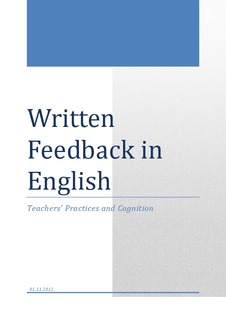| dc.contributor.advisor | Guldal, Tale Margrethe | nb_NO |
| dc.contributor.advisor | Langseth, Inger Dagrun | nb_NO |
| dc.contributor.author | Budimlic, Damir | nb_NO |
| dc.date.accessioned | 2014-12-19T14:41:01Z | |
| dc.date.available | 2014-12-19T14:41:01Z | |
| dc.date.created | 2013-03-26 | nb_NO |
| dc.date.issued | 2012 | nb_NO |
| dc.identifier | 613094 | nb_NO |
| dc.identifier.uri | http://hdl.handle.net/11250/270313 | |
| dc.description.abstract | This study deals with written feedback on pupils’ written texts and teachers’ assessment practices and cognition. Providing effective, written feedback is a complex process that requires knowledge of the competency goal and development of methods for reducing the gap between pupil’s current status and pupil’s preferred state. Effective feedback is feedback that enhances pupils’ learning. In order to enhance learning feedback should contain information related to the following questions: "Where am I going?"; "How am I going?"; "Where to next?" The answers to these questions provide feed up, feed back and feed forward. The three questions must be connected in order to result in pupils’ greater achievement.
The data in this study consists of written feedback collected from teachers at an upper secondary school. The main objective of the study was to examine what kind of written feedback teachers provide to help their pupils further. The feedback texts were analyzed according to Kronholm-Cederberg’s Response Triangle, divided into global and local text levels, and the terms defined above. Eight semi-standardized interviews were also conducted in order to examine teachers’ assessment practices and cognition.
It is my experience that teachers’ responses contained elements at both the local and global text levels with the exception of context at the global level. In terms of the three questions mentioned above, most responses contained clear information about feed back and feed forward, however, there is a lack of feed up (goals) in most of the written feedback texts. This is unfortunate since feed up must be clear in order for pupils to develop further and increase their learning. This study also showed that teachers in general know much about assessment. However, there seems to be a tension between teachers’ knowledge and their practices. Teachers do not always tend to do what they know and believe. | nb_NO |
| dc.language | eng | nb_NO |
| dc.publisher | Norges teknisk-naturvitenskapelige universitet, Fakultet for samfunnsvitenskap og teknologiledelse, Program for lærerutdanning | nb_NO |
| dc.subject | Social and Behavioural Science, Law | en_GB |
| dc.title | Written Feedback in English: Teachers' Practices and Cognition | nb_NO |
| dc.type | Master thesis | nb_NO |
| dc.contributor.department | Norges teknisk-naturvitenskapelige universitet, Fakultet for samfunnsvitenskap og teknologiledelse, Program for lærerutdanning | nb_NO |
